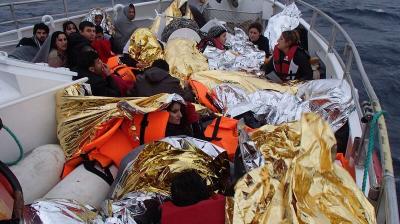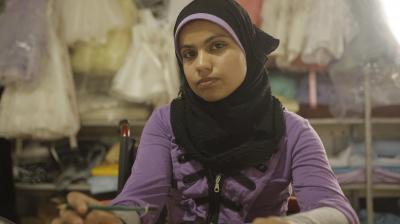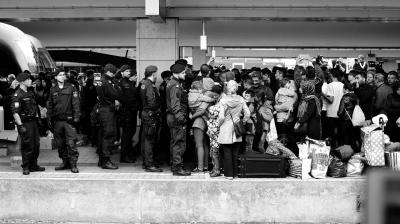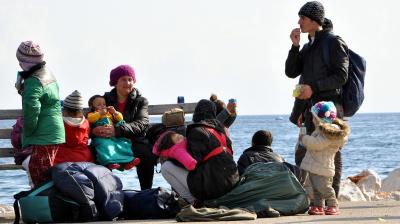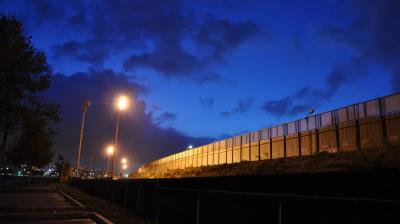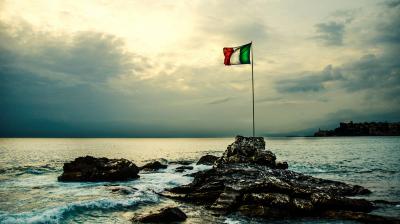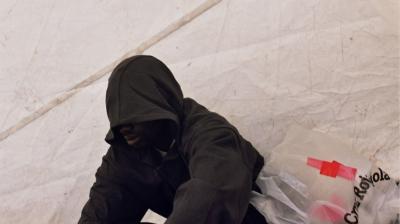
Today, Greece is hosting at least 60,000 asylum seekers. In the context of the EU/Turkey deal, temporary points of transition in Europe have, overnight, been inadequately repurposed into closed detention centres or ‘hotspots’. Because relocation has been scarce and asylum seekers still cross the sea to Greece, they become stuck in camps which are accommodating Greek and Albanian mafia businesses rather than protecting people. A rise in trafficking has been detected since the lockdown of the Balkan route, which subsequently created more pressure for people to migrate, facing the prospect of long-term settlement in the inhumane camps. Due to the unacceptable conditions in the camps, residents run the risk of becoming co-opted or tempted to depend on exploitative relationships with traffickers to move, as those agents become the only timely respondents to their needs.
The situation in the Greek camps
The camps in Northern Greece, which have received the main domestic relocation from the mass settlement along the border of Macedonia, are now becoming crowded, leading to horrid conditions. People are sleeping rough in pitched tents inside disused hangars, factories and ports, or outside in the fields with no protection against the cold and the rain. Since the closing of the Idomeni settlement at the Greek/Macedonian border, the lack of basic facilities, such as running water and health and safety systems, have proven worse in many military or ministry-run camps than in the informal volunteer-run camps. Most camps show no signs of adequate winterisation or housing units yet.
Fatal riots have broken out on several occasions in the camps. Recently, a car was set on fire due to the laissez-faire attitude of the police, when a Syrian mother and child were run over outside the camp in Oreokastro as a car sped past them way over the limit. Camp Moria in Lesvos, the hotspot which receives the majority of Greece’s refugees, has experienced several lethal riots. Kept in prison-style conditions, its 4,000 residents led to this camp being over capacity. Tensions arise upon arrival, as deportation notes are immediately distributed and information following this is scarce and does not accommodate all languages represented. Information on voluntary returns, on the other hand, is very well-organised and provided by EU representatives in most languages.
Systemic flaws for protection of women and girls
- Lack of effective security in the camps, as well as ineffective procedures for identifying those at risk and vulnerable cases.
- Domestic violence and SGBV are rife in the camps, yet go unreported due to a string of social and structural issues (lack of interpreters, fear of deportation, lack of information or lack of money to pay lawyers).
- Insufficient and unsystematic training for staff in recognising SGBV.
- Inconsistent/limited access to legal support services for victims at facilities.
While 59% of refugees stuck in Greece are women and children, a refugee camp is by default a masculine space where the needs of a migrating woman or child are often under-prioritised or misunderstood. A young mother of six children testified that the lack of safety is unbearable. She survived the Softex camp, notorious for its inhumane conditions, drugs and violence: “I didn’t sleep at night. There is no key to the tents, and the men kept breaking into women’s tents,” she recalled. Even the toilets for men and women were not separated, making women unwilling to eat, so as to avoid the risk of sexual assault so rife in the camp. NGOs were coming and going, and no proper management of the camp could secure them properly.”
Systemic flaws for protection of unaccompanied minors
- 10,000 children have been reported missing so far since the start of the Mediterranean crossings; the risk of trafficking is exponentially higher for children than adults.
- On average, 50% of unaccompanied children (UM) registered within reception centres go missing within 48 hours of registration.
- Services are limited and inadequate, and do not take into account the reality of UM concerns or the will to migrate.
Unaccompanied children have often been victims of trafficking and torture, and many have lost their parents during the journey; others are sent away in order to escape war, poverty or persecution. They can be invisible to the limited outreach activities in Greece, and by giving a different age, in line with what smugglers have instructed them to do, they remain undetected. Most of them reside in police headquarters, waiting for accommodation. 2,390 unaccompanied children have been referred for accommodation since the start of 2016 and 911 are still waiting for accommodation. Only 250 unaccompanied children have been relocated from Greece in Europe. Unaccompanied minors are illegally locked up inside several detention centres, and have been so for the last seven months, whilst going through their traumas unattended. According to an independent legal aid organisation, in these cases their respective legal representatives have also been denied access on several occasions.
The need for fundamental rights assurance
There is a desperate need for a stronger focus upon fundamental rights on the ground, particularly due to the lack of understanding with respect to the specific vulnerabilities of women and children. NGOs are now preoccupied with bridging this gap in the Greek Ministry camps, minimising the risks faced by tens of thousands of people who are awaiting the slow relocation process. Many organisations now urge the EU institutions to make a careful assessment of the need for fundamental rights protection clauses and references throughout the draft Regulation on Border Management since, in some instances, their absence could lead to continued violations of human rights upon arrival. Last month, Odysseas Voudouris, Greece’s general secretary for migrants at the Interior Ministry, resigned in response to ‘a mishandling of the camps’ by the Ministry. Voudouris believed the Ministry was dragging out the process of building proper shelters to the point where no agreement would be made on how and when to build them.
The Greek Ministry has decided to open several military-run camps, yet an inefficient matrix of stakeholders manages the current camps in Greece and not much is being done to streamline liability channels to lessen the unbearable everyday human rights abuses. Winter is coming for the second time in this crisis, yet it seems that the reality of migration is still to be discovered by the EU member states.
Henriette Johansen is an Anthropologist and has conducted field work on the issues described.


